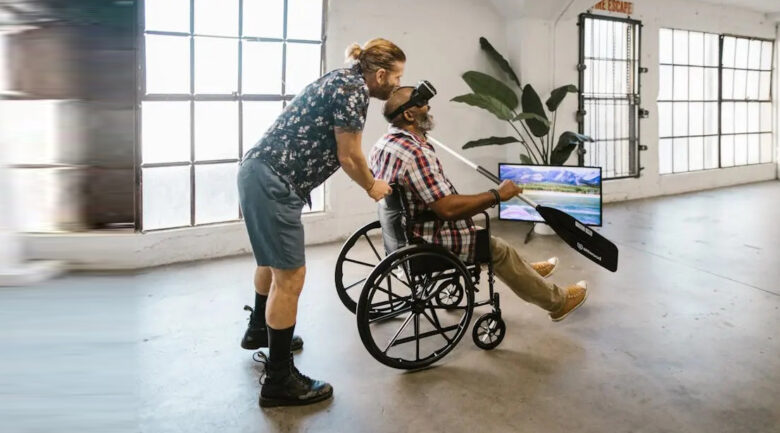Artificial Intelligence (AI) is transforming countless sectors, and dementia care is no exception. With its capacity to analyze data, recognize patterns, and enhance communication, AI is paving the way for innovative approaches to support individuals living with dementia and their caregivers. In this article, we’ll explore twelve remarkable ways AI is making a positive impact in dementia care, showcasing how technology is not just changing lives but improving them for the better.
1. Enhancing Communication Through Smart Devices
Smart devices equipped with AI technology are improving communication for dementia patients by using voice recognition and natural language processing to assist in daily interactions. These tools create an easier pathway for patients to express their needs, making them feel more independent and not feeling trapped by their condition.
Imagine a world where a simple voice command can remind a patient to take their medication or engage in a conversation. This is now possible thanks to innovations in AI that promote interaction. Even more inspiring is the fact that family members can remotely monitor these communications, fostering a sense of connection despite physical separation.
2. Personalized Care Plans Driven by Data
AI algorithms can analyze vast amounts of data to create tailored care plans that adapt to the specific needs and preferences of each individual with dementia. By collecting information on patient behaviors, preferences, and health metrics, AI systems can suggest modifications to care plans that ensure optimal support.
This individualized approach not only enhances trust between patients and caregivers but also promotes proactive care, leading to better health outcomes. Furthermore, caregivers can receive immediate updates about changes in a patient’s condition, which allows for timely interventions when necessary.
3. Predictive Analytics for Early Intervention
Using predictive analytics, AI can identify potential issues before they escalate, allowing caregivers to intervene early and effectively manage symptoms. By analyzing historical data, AI can predict behaviors that might lead to dangerous situations, such as wandering or forgetting important tasks.
For instance, if data indicates that a patient is increasingly confused during specific times of the day, caregivers can optimize their routines to provide additional support. This preemptive approach not only helps in managing dementia more effectively but also ensures a smoother daily life for patients.
4. Telehealth Solutions That Connect Caregivers
AI-driven telehealth applications offer engaging platforms for caregivers to connect with healthcare professionals and receive guidance from the comfort of home. This accessibility is vital, especially for those living in remote areas or for caregivers who may find it challenging to travel.
Virtual consultations powered by AI can also make it easier to maintain continuity of care. With tools that help track symptoms and health changes, caregivers can provide valuable data to doctors, leading to more informed decisions.
5. Virtual Reality for Cognitive Engagement
Virtual reality experiences powered by AI can provide cognitive stimulation for dementia patients, improving memory retention and engagement through immersive activities. These innovative programs transport users to familiar places, enabling them to reconnect with memories and feelings they might have lost.
Imagine a patient revisiting their childhood home or attending a concert from their younger days – experiences like these are not just nostalgic; they promote mental wellness and emotional joy. Moreover, they encourage families to participate in these sessions, fostering shared moments that strengthen connections.
6. Smart Home Technology Enhancing Safety
AI-enabled smart home devices help create safer living environments for dementia patients by monitoring their activities and alerting caregivers of potential risks. From smart motion sensors that track movement patterns to alarms that notify caregivers of unusual behavior, these technologies ensure that help is never far away.
For example, if a patient tends to leave the house during late hours, smart locks can prevent unauthorized exits while still allowing caregivers to grant access when needed. This not only enhances safety but also provides peace of mind to families.
7. Robotic Companions for Emotional Support
AI-powered robotic companions are emerging as valuable tools for providing comfort and reducing loneliness among individuals living with dementia. These robots are designed to interact and engage with patients, offering companionship and even participating in games or activities.
The presence of a robotic friend can be particularly beneficial during times of isolation, making daily routines more enjoyable. Patients often find solace in these companions, which can lead to decreased feelings of anxiety and enhance mental wellness.
8. Machine Learning for Enhanced Caregiver Training
AI can help enhance caregiver training by analyzing interactions and providing tailored feedback, leading to better support for dementia patients. Machine learning algorithms can assess caregiver techniques and suggest adjustments based on patient responses, ultimately leading to improved care.
This evolution in training allows caregivers to become more effective advocates and supporters for their patients. With continuous learning enabled by AI, caregivers are equipped with better skills and strategies, making a substantial difference in the quality of care provided.
9. Data Analysis to Improve Research Efforts
AI-driven data analysis is helping researchers uncover new insights into dementia care, leading to improved treatments and understanding of the disease. By evaluating vast datasets, AI can identify trends that might not be apparent through traditional research methods.
This capability can revolutionize how treatment options are developed and make it easier to pinpoint which therapies are most effective for particular patient demographics. The results are not just theoretical; they translate into real-world applications that benefit countless lives.
10. Engaging Apps for Social Interaction
AI-powered applications designed for social engagement are helping dementia patients connect with loved ones, fostering relationships and reducing feelings of isolation. These user-friendly apps facilitate communication through voice and video calls, bringing families closer together.
Moreover, gamified responsibilities allow users to engage in light-hearted activities with family, such as virtual games or shared playlists. This interaction not only strengthens bonds but also ensures that patients feel included and valued, fostering emotional well-being.
11. Wearable Technology for Health Monitoring
Wearable devices equipped with AI can continuously monitor health metrics, alerting caregivers to any concerning changes in a patient’s condition. From tracking heart rate to monitoring sleep patterns, these devices provide real-time data that enhances decision-making.
This proactive approach can help catch health issues early on. Additionally, caregivers can better understand what works best for their patients, adjusting plans based on insights that wearable technology provides.
12. Establishing a Framework for Ethical AI Use
As AI becomes more integrated into dementia care, establishing ethical guidelines ensures that the technology is used responsibly, protecting patients’ rights and enhancing their dignity. These ethical frameworks are crucial to building trust among stakeholders – patients, families, and healthcare providers alike.
By fostering transparency and accountability, regulatory measures can create standards for how AI systems should function. This not only serves to protect vulnerable patients but also ensures that advancements made in this field uphold the highest ethical standards.




